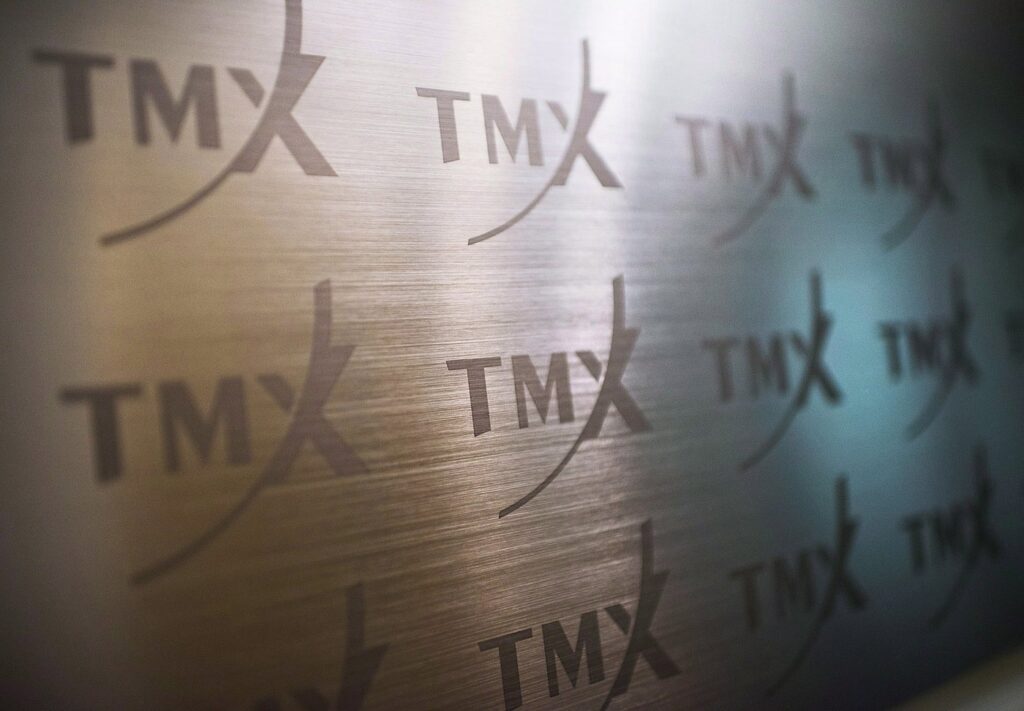
The TMX Group logo, home of the TSX, is shown in Toronto on June 28, 2013. The CEO of the company that operates the Toronto Stock Exchange says most of this country’s small- and mid-sized companies are unprepared for expected new climate disclosure requirements. THE CANADIAN PRESS/Aaron Vincent Elkaim
By Amanda Stephenson in Calgary
Editor’s note:. Dr. Tammy Nemeth has been ringing the warning bell about this for a while now. At the end of the story are two of her recent podcasts on the topic
Most of Canada’s small and mid-sized publicly traded companies are not at all prepared for potentially forthcoming new requirements that could force them to disclose their climate impacts, the CEO of the company that operates the Toronto Stock Exchange said Thursday.
TMX Group CEO John McKenzie said small-cap companies in particular — which may have a market capitalization of less than $10 million and between 10 and 50 employees — are nowhere near ready for new requirements that are currently under consideration for adoption by Canadian securities regulators.
The rule would require publicly traded companies in Canada to disclose to investors a range of information related to climate change and their company’s environmental impact.
“In terms of readiness, for the majority of these (junior) companies, I wouldn’t be exaggerating to say it’s zero,” McKenzie said during a panel discussion at an Alberta Securities Commission conference in Calgary.
“They would not have the capacity, capability or resources to take on a standard like this.”
Among the changes under consideration by Canadian securities regulators include potentially requiring issuers to report all of their company’s greenhouse gas emissions, including so-called Scope 3 emissions — which means those they produce indirectly, such as when a customer uses their product.
The proposed new rules could also require companies to disclose the risk posed by climate change, both when it comes to physical risk to assets and property due to extreme weather, but also business risk related to the energy transition and potential declining demand for carbon-intensive products.
The Canadian Securities Administrators is essentially seeking to come up with a domestic version of a new international standard for climate disclosure that has been adopted by the International Sustainability Standards Board.
In addition, the U.S. Securities and Exchange Commission is also expected to unveil new climate disclosure rules soon, in an effort to meet the demands of investors who increasingly want this kind of information to help guide their decision-making.
But McKenzie said he hopes the Canadian rules will provide exemptions for small-cap issuers, since their investors tend to be different than the large institutional investors, which are demanding increased climate disclosure anyway.
Even larger companies may need extended time frames to come into compliance with more challenging disclosure requirements, McKenzie said.
The reporting of Scope 3 emissions in particular, McKenzie said, is “very difficult to execute.”
The broader conversation about climate disclosure is occurring at the same time that an environmental group has lodged a formal complaint with the Alberta Securities Commission over Suncor Energy Inc.’s climate risk disclosures.
Greenpeace Canada said Thursday that Suncor may have failed to provide full, true and plain disclosure of all material facts in its forward-looking financial statements by failing to disclose business strategy risk and the potential for stranded assets in a low-carbon future.
Suncor’s vice-president for sustainability, Jon Mitchell, was also part of the panel discussion Thursday. He said more stringent disclosure requirements around things like Scope 3 emissions will be challenging for the company.
But he said Suncor also believes it’s important to be upfront with investors about its sustainability progress.
“We have the fundamental belief that our claims have to be backed up by evidence,” he said.
Jonathan Taylor, managing director for sustainability and ESG disclosure for the Alberta Securities Commission, said Canadian securities regulators will need to offer some leniency to companies that may not be able to come into compliance with stringent new disclosure requirements within a short time frame.
He said any Canadian regulation shouldn’t try to copy international standards precisely, but rather contain “modifications” that will make it more palatable to Canadian companies.
“Because the concerns we’re hearing (from companies) are significant. These are not minor, but significant concerns,” Taylor said.
“And they’re being raised by some of the largest issuers in the Alberta market.”
This report by The Canadian Press was first published Oct. 12, 2023.
The Canadian Press
- 0079 Ministry of Energy Business_incentive PO0079 Ministry of Energy Business_incentive PO
- 0078 LHOS 20240078 LHOS 2024
- 0077 Caprice Resources Stand Up For Free Speech0077 Caprice Resources Stand Up For Free Speech
- 0053 Kingston Midstream Westspur Alameda0053 Kingston Midstream Westspur Alameda
- 0076 Latus only0076 Latus only
- 0073 SaskWorks-Pipeline Online0073 SaskWorks-Pipeline Online
- 0063 Turnbull Excavating hiring crusher0063 Turnbull Excavating hiring crusher
- 0061 SIMSA 2024 For Sask Buy Sask0061 SIMSA 2024 For Sask Buy Sask
- 0058 Royal Helium Steveville opens anonymous rocket0058 Royal Helium Steveville opens anonymous rocket
- 0055 Smart Power Be Smart with your Power office0055 Smart Power Be Smart with your Power office
- 0051 JML Hiring Pumpjack assembly0051 JML Hiring Pumpjack assembly
- 0049 Scotsburn Dental soft guitar0049 Scotsburn Dental soft guitar
- 0046 City of Estevan This is Estevan0046 City of Estevan This is Estevan
- 0041 DEEP Since 2018 now we are going to build0041 DEEP Since 2018 now we are going to build
- 0032 IWS Summer hiring rock trailer music
- 0022 Grimes winter hiring
- 0021 OSY Rentals S8 Promo
- 0018 IWS Hiring Royal Summer
- 0013 Panther Drilling PO ad 03 top drive rigs
- 0011
- 0006 JK Junior
- 0002 gilliss casing services0002 gilliss casing services
- 9002 Pipeline Online 30 sec EBEX9002 Pipeline Online 30 sec EBEX
- 9001
